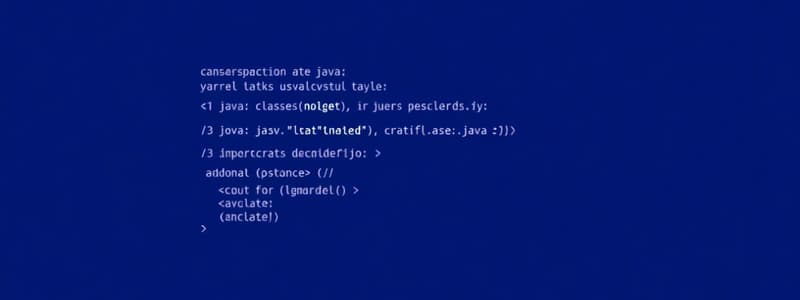Podcast
Questions and Answers
What does the method assertEquals in the test method testEquals verify?
What does the method assertEquals in the test method testEquals verify?
- That the method getX returns a null value.
- That two different MyClass objects are equal.
- That the value of property X is set correctly. (correct)
- That the MyClass object is initialized correctly.
What is the expected outcome when testNull is executed?
What is the expected outcome when testNull is executed?
- It will throw an exception because getX is not set.
- It verifies that the getX method returns a default value.
- It checks that objectOne is properly instantiated.
- It confirms that objectOne.getX() is not null. (correct)
Which method in the ACMEBicycle class modifies the speed variable?
Which method in the ACMEBicycle class modifies the speed variable?
- printStates
- changeCadence
- applyBrakes (correct)
- changeGear
What does the method isLonger in the testTrue method implicitly test?
What does the method isLonger in the testTrue method implicitly test?
What consequence will occur if any of the required methods in the Bicycle interface are not implemented in the ACMEBicycle class?
What consequence will occur if any of the required methods in the Bicycle interface are not implemented in the ACMEBicycle class?
What is the best practice for declaring instance variables?
What is the best practice for declaring instance variables?
How does an instance variable differ from a class variable?
How does an instance variable differ from a class variable?
Why do we declare instance variables as private?
Why do we declare instance variables as private?
What keywords are used to declare a class constant in Java?
What keywords are used to declare a class constant in Java?
What is overloading in the context of methods?
What is overloading in the context of methods?
What do we call a method with the same name as the class and no return type?
What do we call a method with the same name as the class and no return type?
Which keyword is used when implementing an interface in Java?
Which keyword is used when implementing an interface in Java?
In the context of JUnit assertions, which method checks if an object is not null?
In the context of JUnit assertions, which method checks if an object is not null?
Flashcards are hidden until you start studying
Study Notes
Classes, Methods, and Interfaces
- Instance Variables: Declare as private, and write public getter & setter methods
- Instance vs. Class Variables: Class variables are declared using the static keyword, while instance variables do not use this keyword. Class variables are shared amongst all instances of the class, while instance variables are unique to each instance.
- Encapsulation: Achieving encapsulation means hiding implementation details and providing a public interface for interaction. This can be achieved by declaring instance variables as private and implementing public getters and setters, promoting data protection and controlled access.
- Class Constants: Declare using the final static keywords.
- Overloading: Using the same method name with different method signatures (different parameters) allows for flexible code reuse.
- Constructors: Methods that share the same name as the class and have no return type.
- Interfaces: Use the implements keyword to make use of an interface.
JUnit
assertEquals(): Verifies that two values are equal.assertNotNull(): Checks if a value is not null.assertNull(): Verifies that a value is null.assertTrue(): Checks if a boolean expression evaluates to true.
Bicycle Interface
- The Bicycle interface mandates four vital behaviors for any class implementing it:
- changeCadence(int newValue): Modify the cycling cadence.
- changeGear(int newValue): Adjust the gear selection.
- speedUp(int increment): Increase the speed.
- applyBrakes(int decrement): Reduce the speed.
- Implementing the Bicycle interface requires a class to define these methods, ensuring consistent behavior across different bicycle implementations.
- Example implementation:
ACMEBicycleclass.
Studying That Suits You
Use AI to generate personalized quizzes and flashcards to suit your learning preferences.




